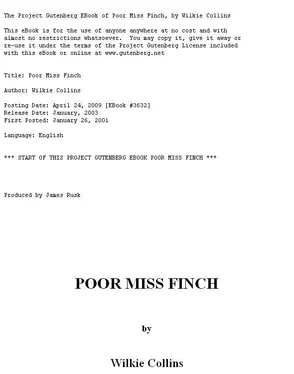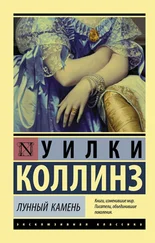Уилки Коллинз - Poor Miss Finch
Здесь есть возможность читать онлайн «Уилки Коллинз - Poor Miss Finch» весь текст электронной книги совершенно бесплатно (целиком полную версию без сокращений). В некоторых случаях можно слушать аудио, скачать через торрент в формате fb2 и присутствует краткое содержание. Год выпуска: 2002, Жанр: Классическая проза, на английском языке. Описание произведения, (предисловие) а так же отзывы посетителей доступны на портале библиотеки ЛибКат.
- Название:Poor Miss Finch
- Автор:
- Жанр:
- Год:2002
- ISBN:нет данных
- Рейтинг книги:3 / 5. Голосов: 1
-
Избранное:Добавить в избранное
- Отзывы:
-
Ваша оценка:
- 60
- 1
- 2
- 3
- 4
- 5
Poor Miss Finch: краткое содержание, описание и аннотация
Предлагаем к чтению аннотацию, описание, краткое содержание или предисловие (зависит от того, что написал сам автор книги «Poor Miss Finch»). Если вы не нашли необходимую информацию о книге — напишите в комментариях, мы постараемся отыскать её.
Poor Miss Finch — читать онлайн бесплатно полную книгу (весь текст) целиком
Ниже представлен текст книги, разбитый по страницам. Система сохранения места последней прочитанной страницы, позволяет с удобством читать онлайн бесплатно книгу «Poor Miss Finch», без необходимости каждый раз заново искать на чём Вы остановились. Поставьте закладку, и сможете в любой момент перейти на страницу, на которой закончили чтение.
Интервал:
Закладка:
There was another public seat, a few paces distant from us. I could stand no longer. I went away by myself and sat down. A dull sensation possessed me. I could neither speak, nor cry. There I sat in silence; slowly wringing my hands in my lap, and feeling the last ties that still bound me to the once-loved friend of former days, falling away one after the other, and leaving us parted for life.
He followed me, and stood over me—he summed her up in stern quiet tones, which carried conviction into my mind, and made me feel ashamed of myself for having ever regretted her.
"Look back for the last time, Lucilla, at what this woman has said and done. You will find that the idea of your marrying Nugent is, under one form or another, always present to her mind. Present alike when she forgets herself, and speaks in a rage—or when she reflects, and speaks with a purpose. At one time, she tells you that you would have fallen in love with Nugent, if you had seen him first. At another time, she stands by while Nugent is personating me to you, and never interferes to stop it. On a third occasion, she sees that you are offended with me; and triumphs so cruelly in seeing it, that she tells me to my face, your prospect would have been a much happier one, if you had been engaged to marry my brother instead of me. She is asked in writing, civilly and kindly asked, to explain what she means by those abominable words? She has had time to reflect since she spoke them; and what does she do? Does she answer me? No! She contemptuously tosses my letter into the fire-place. Add to these plain facts what you yourself have observed. Nugent has all her admiration; Nugent is her favorite: from the first, she has always disliked and wronged me. Add to this, again, that Nugent (as I know for certain) privately confessed to her that he was himself in love with you. Look at all these circumstances—and what plain conclusion follows? I ask you once more—Is Madame Pratolungo a slandered woman? or am I right in warning you (as you once warned me) to beware of her?"
What could I do but own that he was right? It was due to him, and due to me, to close my heart to her, from that moment. Oscar sat down by me, and took my hand.
"After my experience of her in the past," he went on softly, "can you wonder that I dread what she may do in the future? Has no such thing ever happened as the parting of true lovers by treachery which has secretly undermined their confidence in each other. Is Madame Pratolungo not clever enough and unscrupulous enough to undermine our confidence, and to turn against us, to the wickedest purpose, the influence which she already possesses at the rectory? How do we know that she is not in communication with Nugent at this moment?"
I stopped him there—I could not endure it. "You have seen your brother," I said. "You have told me that you and he understand each other. What have you to dread after that?"
"I have to dread Madame Pratolungo's influence, and my brother's infatuation for you," he answered. "The promises which he has honestly made to me, are promises which I cannot depend on when my back is turned, and when Madame Pratolungo may be with him in my absence. Something under the surface is going on already! I don't like that mysterious letter, which is only to be shown to you on certain conditions. I don't like your father's silence. He has had time to answer your letter. Has he done it? He has had time to answer my postscript. Has he done it?"
Those were awkward questions. He had certainly left both our letters unanswered—thus far. Still, the next post might bring his reply. I persisted in taking this view; and I said so to Oscar. He persisted just as obstinately on his side.
"Suppose we go on to the end of the week," he said; "and still no letter from your father comes, for you, or for me? Will you admit, then, that his silence is suspicious?"
"I will admit that his silence shows a sad want of proper consideration for you, " I replied.
"And there you will stop? You won't see (what I see) the influence of Madame Pratolungo making itself felt at the rectory, and poisoning your father's mind against our marriage?"
He was pressing me rather hardly. I did my best, however, to tell him honestly what was passing in my mind.
"I can see," I said, "that Madame Pratolungo has behaved most cruelly to you. And I believe, after what you have told me, that she would rejoice if I broke my engagement, and married your brother. But I can not understand that she is mad enough to be actually plotting to make me do it. Nobody knows better than she does how faithfully I love you, and how hopeless it would be to attempt to make me marry another man. Would the stupidest woman living, who looked at you two brothers (knowing what she knows), be stupid enough to do what you suspect Madame Pratolungo of doing?"
I thought this unanswerable. He had his reply to it ready, for all that.
"If you had seen more of the world, Lucilla," he said, "you would know that a true love like yours is a mystery to a woman like Madame Pratolungo. She doesn't believe in it—she doesn't understand it. She knows herself to be capable of breaking any engagement, if the circumstances encouraged her—and she estimates your fidelity by her knowledge of her own nature. There is nothing in her experience of you, or in her knowledge of my brother's disfigurement, to discourage such a woman from scheming to part us. She has seen for herself—what you have already told me—that you have got over your first aversion to him. She knows that women as charming as you are, have over and over again married men far more personally repulsive than my brother. Lucilla! something which is not to be out-argued, and not to be contradicted, tells me that her return to England will be fatal to my hopes, if that return finds you and me with no closer tie between us than the tie that binds us now. Are these fanciful apprehensions, unworthy of a man? My darling! worthy or not worthy, you ought to make allowances for them. They are apprehensions inspired by my love for You!"
Under those circumstances, I could make every allowance for him—and I said so. He moved nearer to me; and put his arm round me.
"Are we not engaged to each other to be man and wife?" he whispered.
"Yes."
"Are we not both of age, and both free to do as we like?"
"Yes."
"Would you relieve me from the anxieties under which I am suffering, if you could?"
"You know I would!"
"You can relieve me."
"How?"
"By giving me a husband's claim to you, Lucilla—by consenting to marry me in London, in a fortnight's time."
I started back, and looked at him in amazement. For the moment, I was incapable of answering in any other way than that.
"I ask you to do nothing unworthy of you," he said. "I have spoken to a relative of mine living near London—a married lady—whose house is open to you in the interval before our wedding day. When your visit has been prolonged over a fortnight only, we can be married. Write home by all means to prevent them from feeling anxious about you. Tell them that you are safe and happy, and under responsible and respectable care—but say no more. As long as it is possible for Madame Pratolungo to make mischief between us, conceal the place in which you are living. The instant we are married reveal everything. Let all your friends—let all the world know that we are man and wife!"
His arm trembled round me; his face flushed deep; his eyes devoured me. Some women, in my place, might have been offended; others might have been flattered. As for me—I can trust the secret to these pages—I was frightened.
"Is it an elopement that you are proposing to me?" I asked.
"An elopement!" he repeated. "Between two engaged people who have only themselves to think of."
Читать дальшеИнтервал:
Закладка:
Похожие книги на «Poor Miss Finch»
Представляем Вашему вниманию похожие книги на «Poor Miss Finch» списком для выбора. Мы отобрали схожую по названию и смыслу литературу в надежде предоставить читателям больше вариантов отыскать новые, интересные, ещё непрочитанные произведения.
Обсуждение, отзывы о книге «Poor Miss Finch» и просто собственные мнения читателей. Оставьте ваши комментарии, напишите, что Вы думаете о произведении, его смысле или главных героях. Укажите что конкретно понравилось, а что нет, и почему Вы так считаете.






